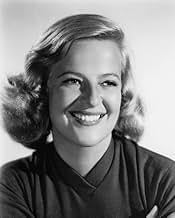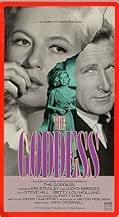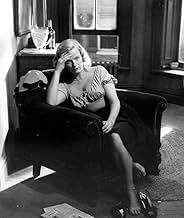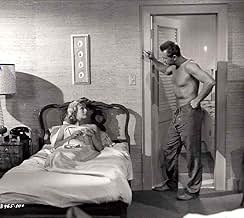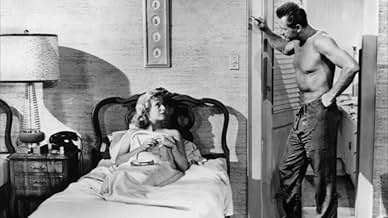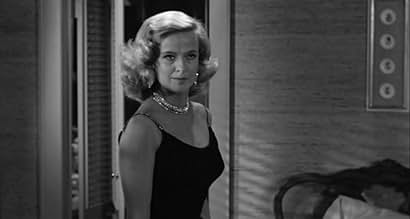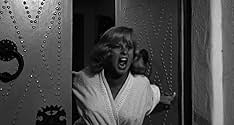IMDb RATING
6.6/10
1.3K
YOUR RATING
A woman adored by the people around her ultimately struggles to be happy with herself.A woman adored by the people around her ultimately struggles to be happy with herself.A woman adored by the people around her ultimately struggles to be happy with herself.
- Nominated for 1 Oscar
- 1 win & 1 nomination total
Steven Hill
- John Tower
- (as Steve Hill)
Margaret Brayton
- Mrs. Woolsy
- (uncredited)
Curt Conway
- The Writer
- (uncredited)
- Director
- Writer
- All cast & crew
- Production, box office & more at IMDbPro
6.61.2K
1
2
3
4
5
6
7
8
9
10
Featured reviews
Devastating - the most complete testament to the art of Kim Stanley
In "Broadway: The Golden Age", Rick Mckay's wonderful documentary, Kim Stanley receives tremendous praise from all the great actors of that time as being especially influential. With the publication of her biography there seems to be a renewed interest in her life and career.
Unfortunately very little is left in the way of documentation of her talents. She came to movies after a career on Broadway and a number of live television plays. But her film career was not to be, owing to the many personal problems she suffered from, which seemingly burnt her out.
"The Goddess" was her first film and it remains the most complete testament to her talents. As such, it really is a must for anyone who appreciates the art of acting. The title role allows for a huge range, from hopeful teenager to jaded Hollywood star. Although clearly too old to play a teenager and definitely no screen beauty worthy of the title "goddess", Stanley pulls it off with the sheer force of her acting. Her portrayal of the breakdown of the actress is devastating. It's particularly disturbing in the light of the similarity of what would become her very own fate.
Paddy Chayevsky paints a bleak picture of the Hollywood Star system as he would later do with network television in "Network". Although well written, it's not an especially astute script lacking in both scope and depth. There is good support form Betty Lou Holland and Lloyd Bridges, but the only reason to seek this one out remains Kim Stanley.
Unfortunately very little is left in the way of documentation of her talents. She came to movies after a career on Broadway and a number of live television plays. But her film career was not to be, owing to the many personal problems she suffered from, which seemingly burnt her out.
"The Goddess" was her first film and it remains the most complete testament to her talents. As such, it really is a must for anyone who appreciates the art of acting. The title role allows for a huge range, from hopeful teenager to jaded Hollywood star. Although clearly too old to play a teenager and definitely no screen beauty worthy of the title "goddess", Stanley pulls it off with the sheer force of her acting. Her portrayal of the breakdown of the actress is devastating. It's particularly disturbing in the light of the similarity of what would become her very own fate.
Paddy Chayevsky paints a bleak picture of the Hollywood Star system as he would later do with network television in "Network". Although well written, it's not an especially astute script lacking in both scope and depth. There is good support form Betty Lou Holland and Lloyd Bridges, but the only reason to seek this one out remains Kim Stanley.
New Kim Stanley fan
I recently caught this movie on TCM and loved every second of it. Kim's accent gets a bit tiresome but the overall effect is great. Love the scene in which Patty Duke, playing The Goddess as a neglected child, pathetically tells her cat that she got promoted to the next grade in school. This movie contains all of the tried and true "money and fame aren't everything" requisites. I wish Kim Stanley had tried her hand at Tennessee Williams. She has that "Geraldine Page" affectation that Mr. Williams apparently appreciated. I remember her from "Frances". It's too bad she didn't do more movies. The Goddess is a wonderful look at late 50s Hollywood and the inherent danger in getting what you've always wanted.
I saw this film a long time ago in New York and have wanted to see it again ever since
I saw this film a long time ago in New york and have wanted to see it again ever since. I remember that Kim Stanley was, maybe, the most astounding actress I've ever seen. She had depth few actress' possess now days. Only Meryl Streep comes close. It's worth it just to see, what many of the inner circle of the New York Broadway group of the time called Americas greatest actress, do her thing.
Great performance by Kim Stanley!
After watching Kim Stanley give an absolutely great performance in "Seance On A Wet Afternoon", I wondered if that was a one time great performance! I recently watched "The Goddess", and I got my answer: another great performance by Kim Stanley, and so I now conclude that Kim Stanley was a great actress, and, by the way, in looks and acting style, she reminded me of another great actress: Geraldine Page! In this movie, she portrayed a Marilyn Monroe type woman who sought stardom in Hollywood, but paid a heavy price for it! The supporting cast was good! I rather liked Steven Hill's excellent performance as her first husband; likewise, Lloyd Bridges excellent performance as her second husband! Also worth mentioning was Betty Lou Holland's excellent performance as her mother! An interesting movie worth watching for Kim Stanley's great performance!
10qmax
One Goddess plays another
Kim Stanley was the great interpreter of William Inge at the time he was the most successful playwright in America. On Broadway she played Millie, the younger sister, in his "Picnic" and Cheri in "Bus Stop" -- ironically, the role played in the movie by Monroe, the model for "The Goddess." Cast in "The Goddess", Stanley is clearly too old for the part, and not cinematically 'beautiful' enough. What she does bring to the role is an astonishing talent based on flawless technique and an emotional sensitivity that both made her career and destroyed it. I ran across the movie by accident when I was about 12 years old, and Stanley's performance has continued to haunt me for 36 years. The making of "The Goddess" was so emotionally agonizing that Stanley essentially fled from the movie business. How brilliant she would have been in dozens of roles that won acclaim for lesser talents. Many years later she played Jessica Lange's mother in "Frances" -- a similar story of a glamourous and tragic film star. She told Lange, "As soon as this movie's over, do a comedy. Immediately. Any comedy you can get your hands on." That comedy was "Tootsie" which won Lange her first Osacr.
Did you know
- TriviaJoan Copeland, who played Alice Marie in the movie, was the sister of playwright Arthur Miller. This made her, at that time, the sister-in-law of Marilyn Monroe, whose life was ostensibly the basis for the story.
- GoofsEmily claims that Stage Door, a play she appeared in during high school, was written by Moss Hart and George S. Kaufman; in reality it was written by Kaufman and Edna Ferber.
- Quotes
Lester Brackman: Well, she's got something, Dutch. She's very good in this picture. She's going to attract a lot of attention. She's got what I call the quality of availability.
- ConnectionsFeatured in Precious Images (1986)
- How long is The Goddess?Powered by Alexa
Details
- Release date
- Country of origin
- Language
- Also known as
- La diosa
- Filming locations
- Ellicott City, Maryland, USA(Emily's hometown)
- Production company
- See more company credits at IMDbPro
Box office
- Budget
- $550,000 (estimated)
- Runtime
- 1h 44m(104 min)
- Color
- Aspect ratio
- 1.85 : 1
Contribute to this page
Suggest an edit or add missing content


